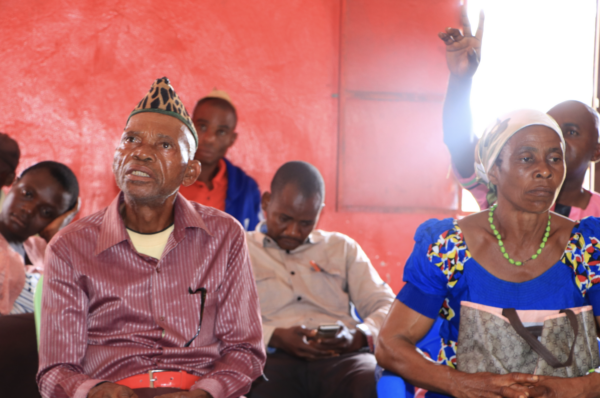Local chief embraces change towards championing inclusive peacebuilding and governance in the Kasaï region
André Kalamba Dilondo, the chief of Kalamba village in the Tshofa local administrative unit, Mweka territory, Kasaï province, Democratic Republic of Congo (DRC), has played a significant role in promoting peacebuilding and inclusive governance between the Kuba and Teke communities in the troubled Kasaï region.
Since 2016, the once peaceful Kasaï region has been plagued by conflicts known as the "Kamuina Nsapu" conflicts. These conflicts originated a dispute over Prince Jean Mpandi’s alleged customary power as the chief of the "Bajila Kasanga" village in the Dibaya territory, Kasaï-Central province. The situation escalated in the Mweka territory, leading to a conflict between the Kete and Kuba communities in the Kakenge locality. The Kete community consists of the Luba people, an Indigenous ethno-linguistic group in the south-central region of the DRC, while the Kuba, also known as Bakuba or Bushongo, comprise around 16 Bantu-speaking groups in southeastern Congo.
As the conflicts unfolded, traditional chiefs with Luba connections, whose authority was also challenged, brought the conflicts to Kasaï province. In response, loyalists and other communities formed self-defence forces to protect themselves. Exploiting this turmoil, the Kete forcibly evicted some Kuba from their homes due to pre-existing land disputes. Chief Kalamba André, a respected figure within the Kete community, supported this action and claimed the confiscated houses, often referred to as “secondary occupations.” The situation worsened as violence erupted among the chief’s followers, the government, and the security forces involved. Traditional chiefs of Kuba descent also brought these conflicts to Kasaï province as their authority was contested. To counter this threat, loyalists and other communities aligned themselves with the loyalist forces, forming self-defence forces for protection.
However, Chief Kalamba, who was initially a warlord, has transformed into a champion of peace in his region. He has actively participated in numerous peacebuilding activities organised by Action pour la paix et la concorde (APC) in partnership with InterpeaceThese activities were funded by the Swedish Agency for International Development (SIDA) and were part of two projects: the Mediation and Reconciliation project initiated in 2019, and the Strengthening Inclusive Peace Governance in the DRC project in 2021. In the Kasaï region, Interpeace launched the programme "Strengthening Inclusive Governance of Peace in Kasaï and Kasaï Central" to build trust between national authorities and customary power. Unlike other conflicts in the DRC, the conflict in Kasaï primarily arises from tensions between customary power and authority rather than power struggles, identity, or resources. This has resulted in rivalries between the Luba and non-Luba ethnic groups, intensified by disputes over new administrative positions.
Chief Kalamba gradually recognised the significance of peace and harmonious coexistence in community development through the peacebuilding projects. In 2020, he reconciled with his adversary, Shakobe, a Kuba traditional chief, by signing a peace pact. During a 2022 dialogue on identifying dialogue zones and actors, Chief Kalamba announced that he had instructed his community members to return the houses they had confiscated from the Kuba.
Emphasising the importance of inclusion, Chief Kalamba stated: “Thanks to the dialogues and peacebuilding activities organised by Interpeace in collaboration with APC, in which I participated, and the awareness generated from these activities, I instructed my ‘Kete’ community members to release the houses of our ‘Kuba’ community brothers that they had occupied.”
Members of the Kuba community confirmed this progress during the 2023 journalists training event that focused on conflict sensitivity before, during, and after the DRC general elections held on 20 December 2023. Since then, the two communities have developed a mutually beneficial relationship and have even collaborated in resolving land conflicts in the Mpalulu forest, also known as Angola. Whenever issues arise among their members, influential figures from both communities come together to find suitable solutions.
During an event focused on inclusive peace governance and women's leadership, Chief Kalamba met Charlie Changa Bimuenyi, a peacebuilding activist from the Interpeace programme. Through her advocacy, Chief Kalamba agreed to include women in his royal council. Recognising the valuable roles women play in the community, he appointed eight women to this council.
Click here to learn more about Charlie Changa Bimuenyi


